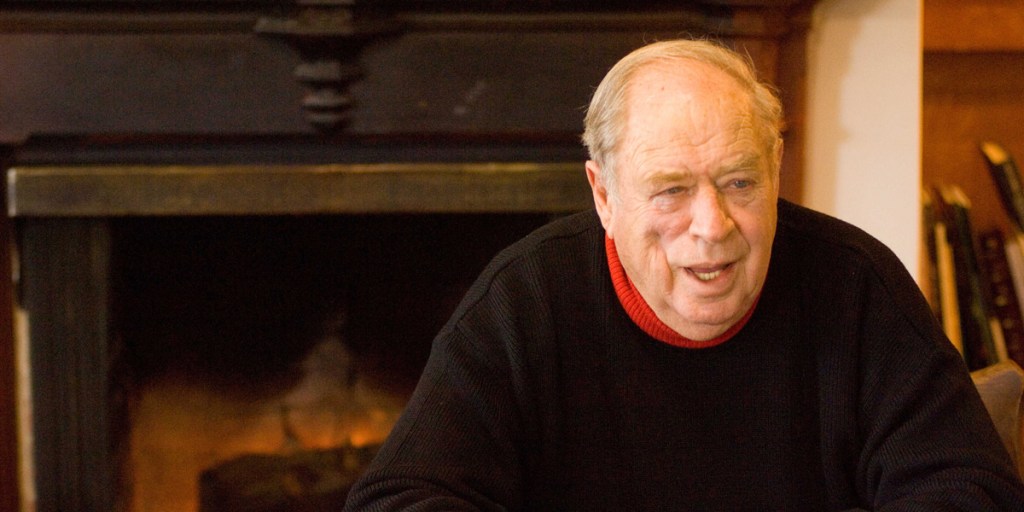Peter Lehmann: From one mate to another

On July 26, on the grounds of Peter Lehmann Winery, there will be a gathering of those who seek to acknowledge the life and work of Peter Lehmann, who died on June 29 aged 82.
Philip Lehmann, one of Peter’s three winemaking offspring, explained that his father “did not want a funeral, nor any speeches”, but there would be this opportunity for those who respected and remembered the man, with “no speeches or pontification, except from one mate to another”.
It is perhaps the greatest tribute to the mighty winemaker that upon his death from complications relating to kidney failure, his family’s grief was made so much more difficult by the thought of attempting to stage a funeral: there would simply be too many people for any Barossa church or hall, and the notion of holding and catering for such an event outside of the Barossa was, as Peter would say, “not on the cards”.
For a person who is exhausted from his own recent spate of eulogising, the notion of capturing the life and importance of a friend like Peter in an obituary of the usual length is a difficulty of similar proportion. Each time I start, I know it will be impossible to stop for hundreds of pages, and the grief is too raw to embark upon the biography which should be written. Adding to the scale of this task is the mountain of facts that would need forensic checking, for Peter was quite simply a man of legendary status in his own lifetime, a reputation now magnified by the plethora of tributes his death triggered from journalists and wine writers all over the world.
Everybody loved Peter.
"Peter was involved in a constant string of momentous, often desperate moves to save the growers and therefore the nature of his beloved Barossa from mindless industrial homogeny."
By its nature, legend cannot be verified factually; it is an old story which tradition eventually presumes to be historical. It’s something a biography can contribute to, but this should happen only by the painstaking separation of fact from emotion and opinion. In the case of Peter, this is an insurmountable task at a time like this. Bacchus knows, there are thousands of us suffering a flood of emotion and opinion, as is our due, and is even more Peter’s due.
You might like
But one thing said by many needs clarification. Peter’s greatest move was not simply his leading of the children of the Barossa, its small grape-growers, on his famous exodus from Saltram after he’d been ordered to cease buying their fruit.
Through those turbulent and treacherous years from the formation of his first redemptive winery, Masterson Barossa Vineyards in 1977, until his eventual sale of the majority of Peter Lehmann Wines to Hess Family Estates in 2003, Peter was involved in a constant string of momentous, often desperate moves to save the growers and therefore the nature of his beloved Barossa from mindless industrial homogeny.
Anybody who witnessed any of those urgent meetings around the Lehmann kitchen table can never forget their intensity. The combination of full-strength B&H smoke with the fume of burning Mallee roots and redgum in the big fireplace; the table with its books and documents and newspapers; the constant ABC FM music; the endless supply of beautiful red wine, crusty bread and smoked ham; the gathering of those scarce ones with the money; those with the intention and the ideas, and those with nothing more to offer than support and awe at the sheer torque of that collective engine that Peter drove are a set of sensory images that remain etched in the lives of all who were there.
It is difficult to explain the power of forces which worked to clear the Barossa of its peasant-scale grape-growing culture once the big industrialists convinced themselves that their modern trellised monocultural grapeyards were capable of replacing any notion of terroir or heritage. Their new version of the science of viticulture would overwhelm any notions so emotive or industrially inefficient and replace them with better returns for their shareholders, at the cost of the very nature of the Barossa and its residents as much as the drinkers.
By the mid-’80s, even the government was seduced, and used taxpayer money to pay for the destruction of irreplaceable, invaluable heritage pre-phylloxera vineyards to make way for modern monoculture in what was brutally called the Vine-pull Scheme.
Of the many deserving credit for the final cessation of this destruction, and it was war, none assisted in a more practical manner than Peter, who, through his untiring stubborn determination, schemed and borrowed and strove to keep sufficient money in his coffers to pay these threatened growers for their fruit.
He did this first through a collective financial cunning, but then equally via his personal sensitivity to bouquet and flavour in his winery: Peter was first and foremost a very special winemaker, beloved by his stalwart winery team.
Ancient vineyards which now provide the much-modernised Barossa with its international respectability among wine-lovers were saved, leaving the world with a genetic resource and a set of flavours which phylloxera destroyed in Europe.
Stay informed, daily
The Barossa has a good memory. It knows this. Which is why Margaret Lehmann and her family faced an impossible task, handling their deep grief on a day when they’d also have to handle a crowd of unknown proportion.
The Lehmanns, and the Barossa, now have time to gird their loins and get down to doing something they do better than any other community in this country: work together to organise a gathering. What a gathering it will be.
Statement from the Lehmann family
18/8/1930 – 28/6/2013
Goodbye Peter. As a family we’ve drawn together and are privately digesting the enormity of his death. Given the life he led, for him there weren’t too many questions left un-answered. While we’re incredibly sad, we’ll say goodbye with the richness of his life in our hearts rather than the regrets for what might still have been.
It was often said that PL was a gambler. And yes, he loved a punt. The truth in his eyes was he didn’t consider it chance when he knew he had an unbeatable hand. Margaret, always by his side, was the ‘card counter’ that gave him the formidable edge.
Pl was a man of many words… but rarely were they expected, and never self-aggrandising. He endured ceremony poorly and never suffered ‘self-importance’ except as fodder for his incisive wit. He would see anyone on their deeds, rather than their position. One thing that we all know is that PL could see through the bullshit. “My name is not Mr Lehmann, call me Peter”.
To his close family and friends, PL made it abundantly clear that there should be no funeral, nor memorial service for him. Since he detested funerals, why would he want to go to his own? What he would have highly approved of, however, was a get-together over a schluck, a bite to eat and plenty of larger than life yarns. So in fitting style, on Friday the 26th of July, a gathering will be held on the grounds of Peter Lehmann Wines, from 2pm-4pm, so we can all do just that. There will be no speeches, rather just come together to cheers a mate, a father, and most importantly, a husband.
If he were here, as usual PL would have had the last word “…Yes Margaret”








